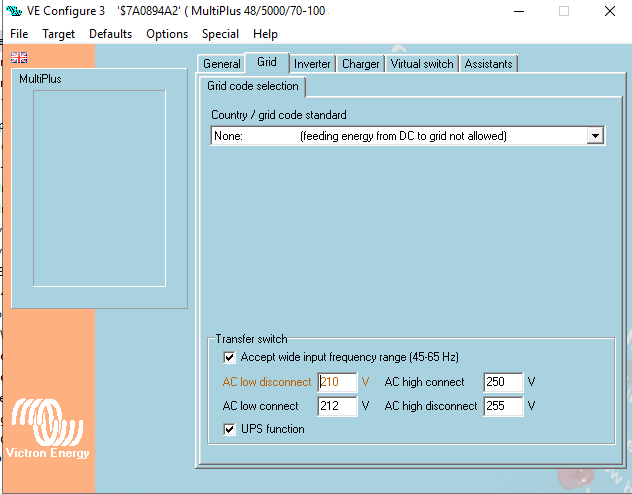*****System: Off Grid
3 x Victron Quattro 10kva
1 x Fronius 10kW Symo - 1 x 20kW Symo
18 x Pylontech US 3000
2 x Skylla 48v 50ah AC chargers ( Supplement charge for batteries )
84 x 410w JA Solar Mono half cell
System was installed on new build home. We experienced dipping in the lights. The electrician has done a logger test last week and the results are a bit concerning. Lowest dip recorded was 180v ( 10 - 60 milliseconds), and it regularly dips below 10%, 207v.
Highest swell recorded 257v (10 - 60 milliseconds )
Attached logger data and Victron data ( 1 min intervals )
AMSO 1216 JNF Electrical.pdfHuis Visser Statistics for week 21 May to 28 May 2021.pdf
L1 (Victron) - Phase B (Logger Test)
L2 - Phase C
L3 - Phase A
The underfloor heating runs on Phase C (L2). It switched off on Tuesday morning and technicians are coming in to have a look.
My question is, has anybody experienced a similar situation? Is there a way to minimize the shifting?
Thank you
**********************************************************************************************
Update:
* Results of second test. First 36hrs main DB incoming 3 phase line from Off grid system. Last 36hrs directly on Victron output and termination boxes. (This was done to check that data corresponds and we have no other electrical problem in-between DB and Inverters.)
Results are still the same.
*The underfloor heating has been fixed. Unrelated issue
* We have done a firmware Quattro's and N-E bond in the termination boxes. ( This was done before new logger test was done)
* Lights are more stable. Flickering only happens when sun is going down, load increases and the shift happens between Fronius not being able to supply sufficient power and the batteries taking over (100% SOC) I will follow up with Fronius to see if there is a fix for this. ( I have upgraded the Fronius to latest software)
* My question is: The fluctuations are very short in duration 20 - 40 milliseconds. On average we remain on 230V. I do understand being fully of grid will make the voltages fluctuate. Is this in normal parameters? Is there a way to minimize it? Will it have a negative long-term effect on household appliances?
***********************************************************************************************

